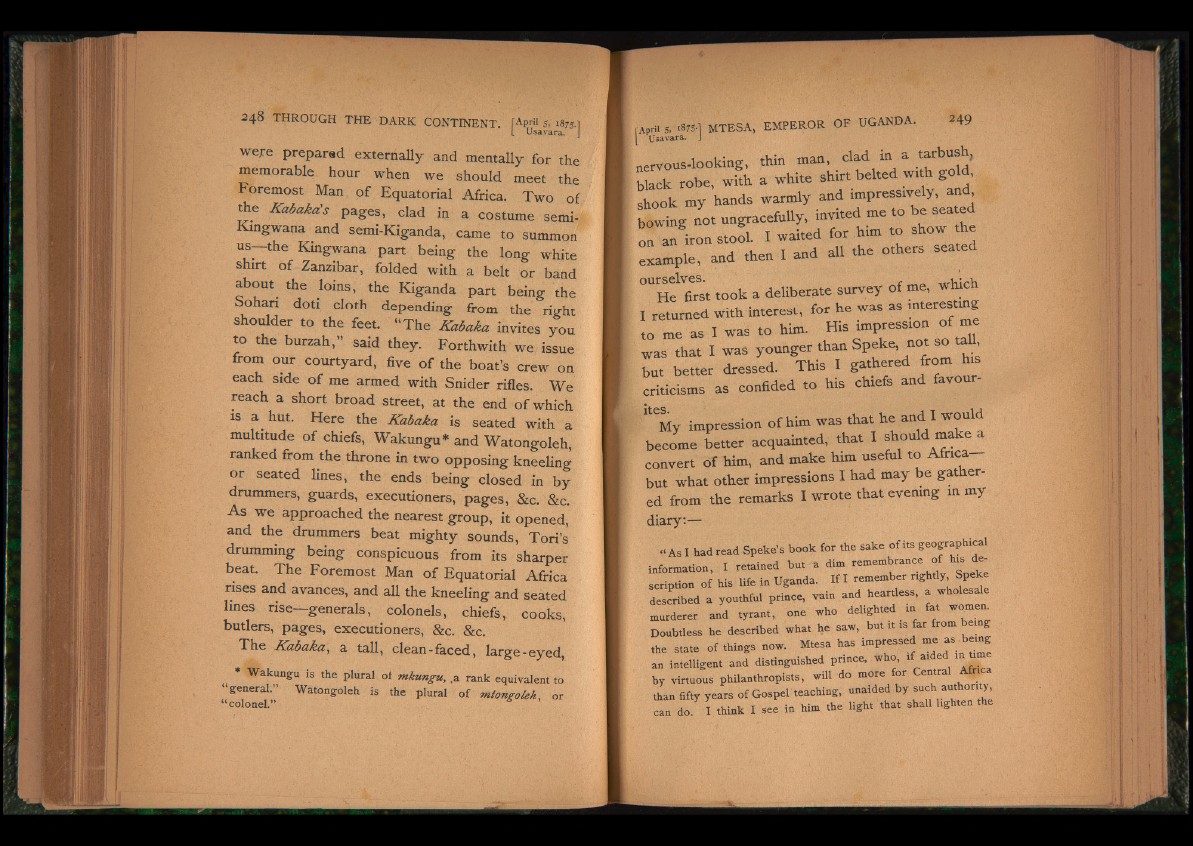
were prepared externally and mentally for the
memorable hour when we should meet the
Foremost Man o f Equatorial Africa. Tw o of
the K a h a ka ', pages, clad in a costume semi-
Kxngwana and semi-Kiganda, came to summon
us— the Kingwana part being the long white
shirt o f Zanzibar, folded with a belt or band
about the loins, the Kiganda part being the
o ri doti cloth depending from the right
shoulder to the feet. “ The Kabaka invites you
to the burzah,” said they. Forthwith we issue
from our courtyard, five o f the boat’s crew on
each side o f me armed with Snider rifles. We
reach a short broad street, at the end o f which
is a hut. Here the Kabaka is seated with a
multitude o f chiefs, Wakungu* and Watongoleh,
ranked from the throne in two opposing kneeling
or seated lines, the ends being closed in b y
drummers, guards, executioners, pages, &c. &c.
A s w e approached the nearest group, it opened,
and the drummers beat mighty sounds, T o r i’s
drumming being conspicuous from its sharper
beat. T he Foremost Man o f Equatorial Africa
rises and avances, and all the kneeling and seated
lines rise— generals, colonels, chiefs, cooks,
butlers, pages, executioners, &c. &c.
T he Kabaka, a tall, clean-faced, large-eyed,
* Wakungu is the plural oí mkungu, ,a rank equivalent to
“ general.” Watongoleh is the plural of mtongoleh, or
“ colonel.”
nervous-looking, thin man, d ad in a v xb u sh ,
black robe, with a white sh ir tb e lted w . t h g o ,
shook my hands warmly and impressively, and,
bowing not ungracefully, invited me to b e seated
orTan iron stool. I waited for him to show he
example, and then I and all the others seated
“ “ S e 't a t ,00k a deliberate survey of me, winch
I returned with interest, for he was as
to me as I was to him. His 'mP<ess"°“ u
was that I was younger than Speke, not so ta ,
but better dressed. This I gathered from his
criticisms as confided to his chiefs and favour-
‘ ‘ My impression o f him was that he and I would
become better acquainted, that I should m a k e a
convert o f him, and make him useful to A fh c
but what other impressions I had may be gathered
from the remarks I wrote that evening m my
diary:—
“ As I had read Speke’s book for the sake of its geographical
information, ! retained but a dim
scription of his life in Uganda. I f I remember rightly, Speke
described a youthful prince, vain and heartless, a who^ le
murderer and tyrant, one who delighte in a w .
Doubtless he described what he saw, but it is far from bei g
the state of things now. Mtesa has
an intelligent and distinguished prince, who, if aided | j g |
by virtuous philanthropists, will do more for Central Africa
than fifty years of Gospel teaching, unaided by suchauthon^ y
can do. I think I see in him the light that shall lighten